Claudia Chen, Ife Ademolu-Odeneye, Devin Zhang
BACKGROUND: For this sketch, we created a targeted Facebook ad with a quiz to convince the user to move to Bangor, Maine. The basis of our sketch was the Air Quality dataset, and our target audience was millennials in polluted cities potentially looking to move somewhere new. We acted as the Bangor City Council, attempting to entice people to move somewhere new.
RESEARCH: For our project, we mainly focused on PM 2.5 air quality data. PM 2.5 is fine particulate matter that is around 2.5 microns in diameter. Because of its small size, it is easily inhaled and can be harmful when someone is exposed to it repeatedly or at high quantities. We researched cities that had good and bad levels of PM 2.5, and we found that Bangor, ME had good levels of PM 2.5 while also having several incentives to try and convince people to live there.
FORMAT: For our audience to reach the quiz, we created a targeted Facebook ad to entice people to click in to the quiz. Because the focus of the quiz was around benefits of living in spaces without heavy air pollution, we made our headline about air pollution. That way, the audience had some idea of what they were clicking in to, without giving the novel information away.
Once the ad is clicked on, the quiz we created would begin. The quiz asks the user questions such as where do you live, do you enjoy outdoor activities, and do you have student loans, to provide results pages with the benefits of Bangor as it relates to both air quality and other factors of living there. This is the outline of where the quiz would go according to the user’s responses:
Below are images of a few of the key question & result pages that appear as the user answers the questions.
With the question-answer format of a quiz, we were able to slowly reveal more information to convince the user to move to Bangor. From the city council perspective, we felt this was much more effective than the traditional methods of providing a list or article of reasons to move to Bangor.
SOURCES:
Air Quality Dataset: https://aqicn.org/here/
Bangor Student Loan Initiative: https://www.cnbc.com/2018/10/15/maine-is-providing-student-debt-relief-to-people-willing-to-work-there.html
Maine forest coverage: https://en.wikipedia.org/wiki/Forest_cover_by_state_and_territory_in_the_United_States
Negative effects of PM: https://www.epa.gov/pm-pollution/particulate-matter-pm-basics#effects
Dangers of PM exposure: https://laqm.defra.gov.uk/public-health/pm25.html
PM effects on children and elderly: https://www.health.ny.gov/environmental/indoors/air/pmq_a.htm
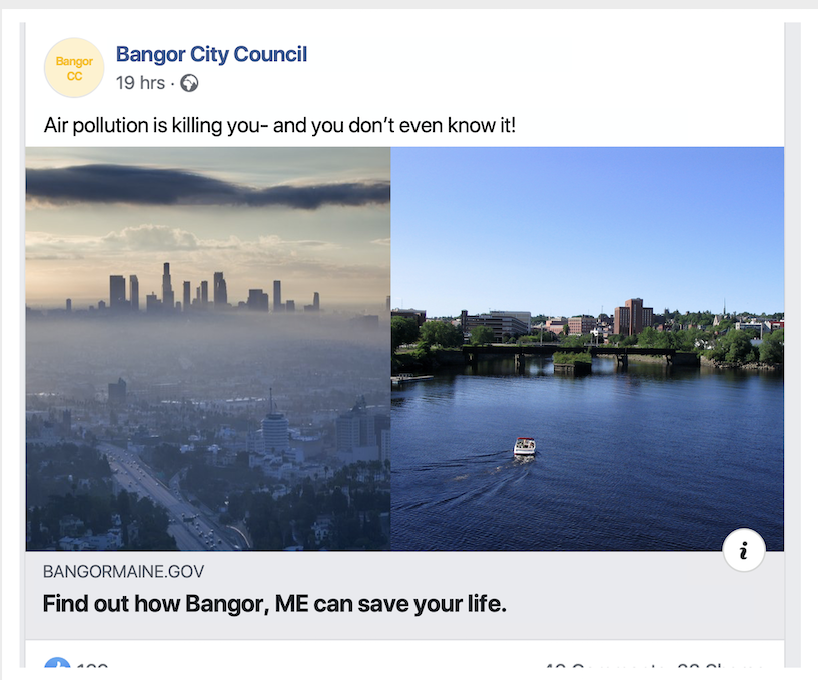
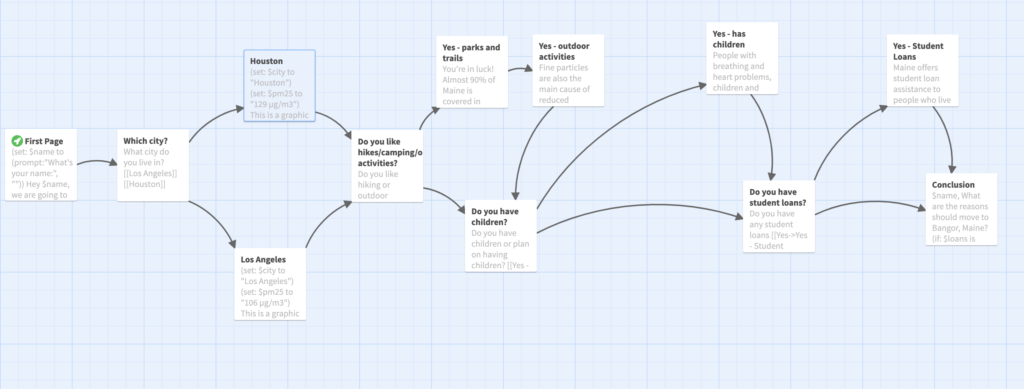

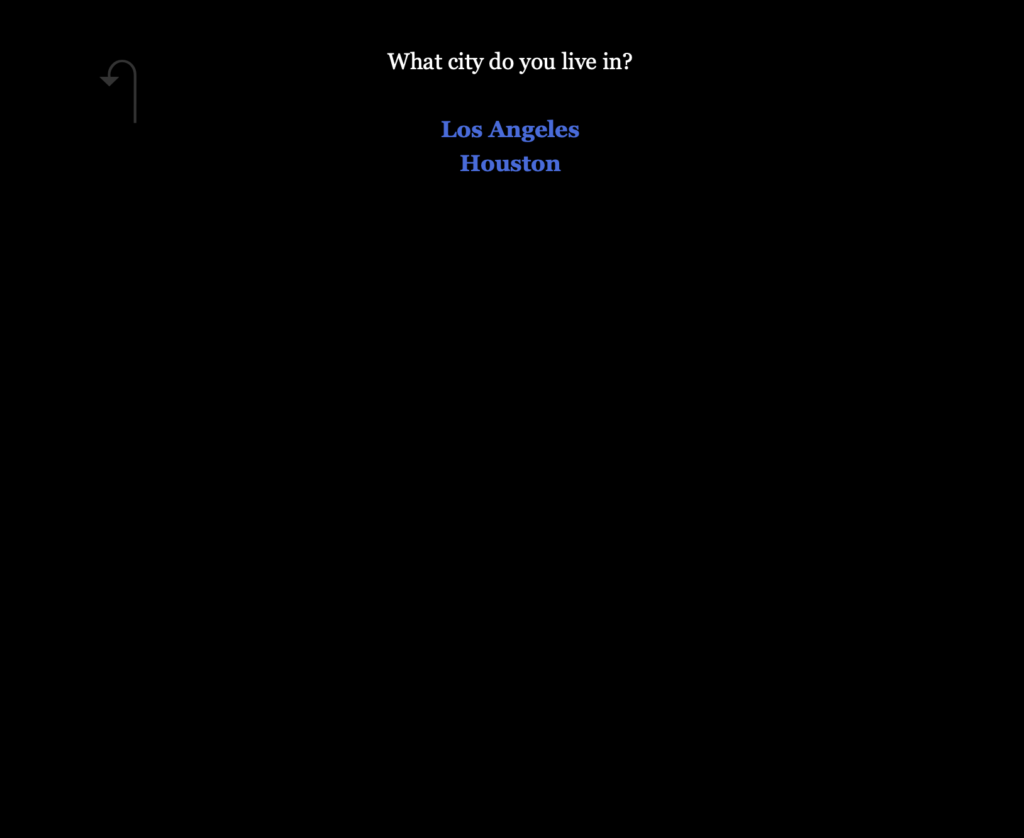
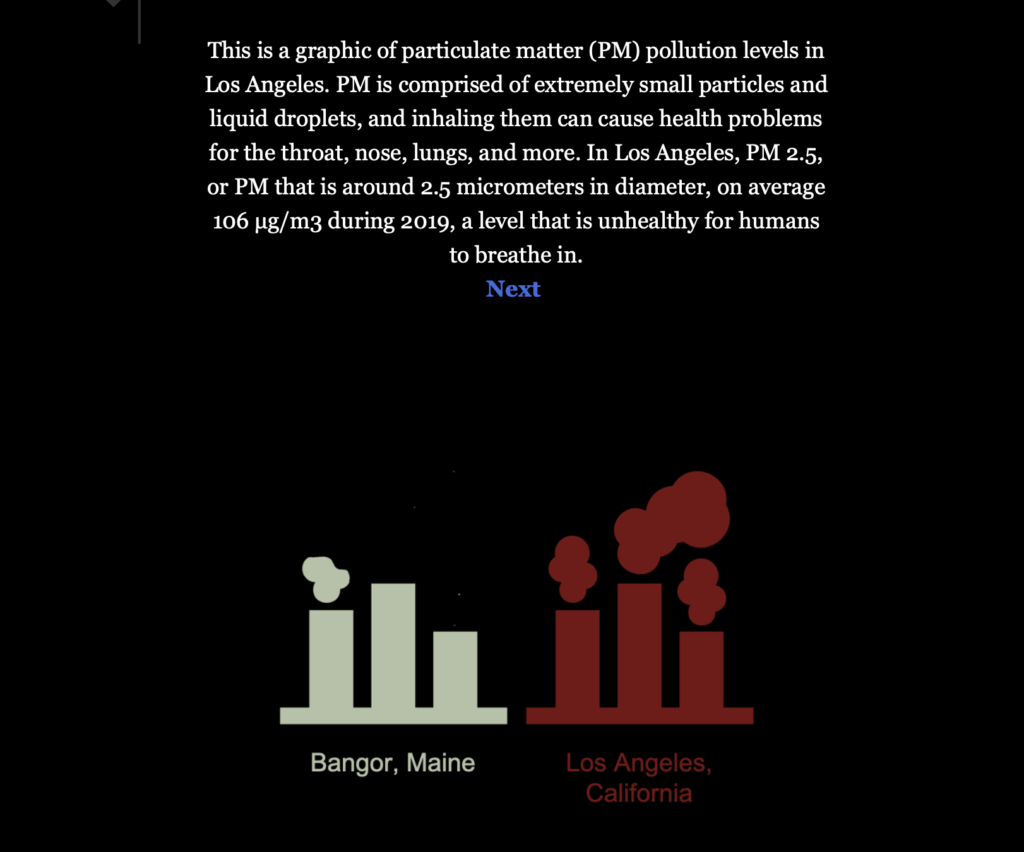
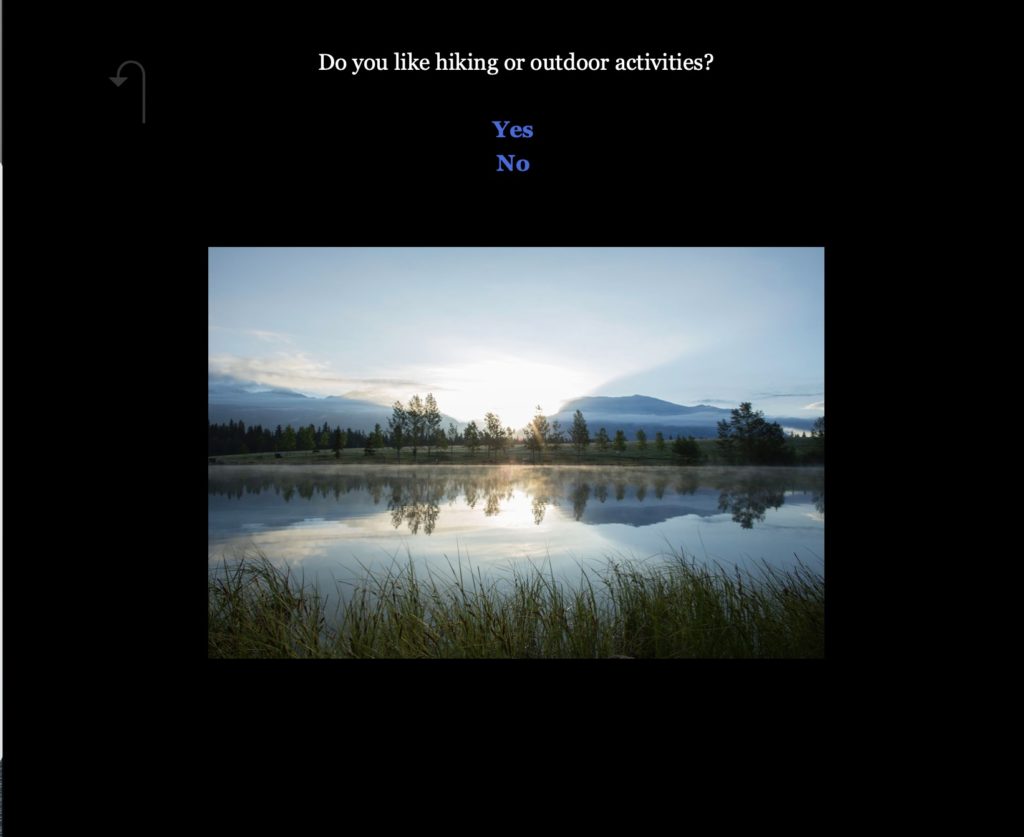
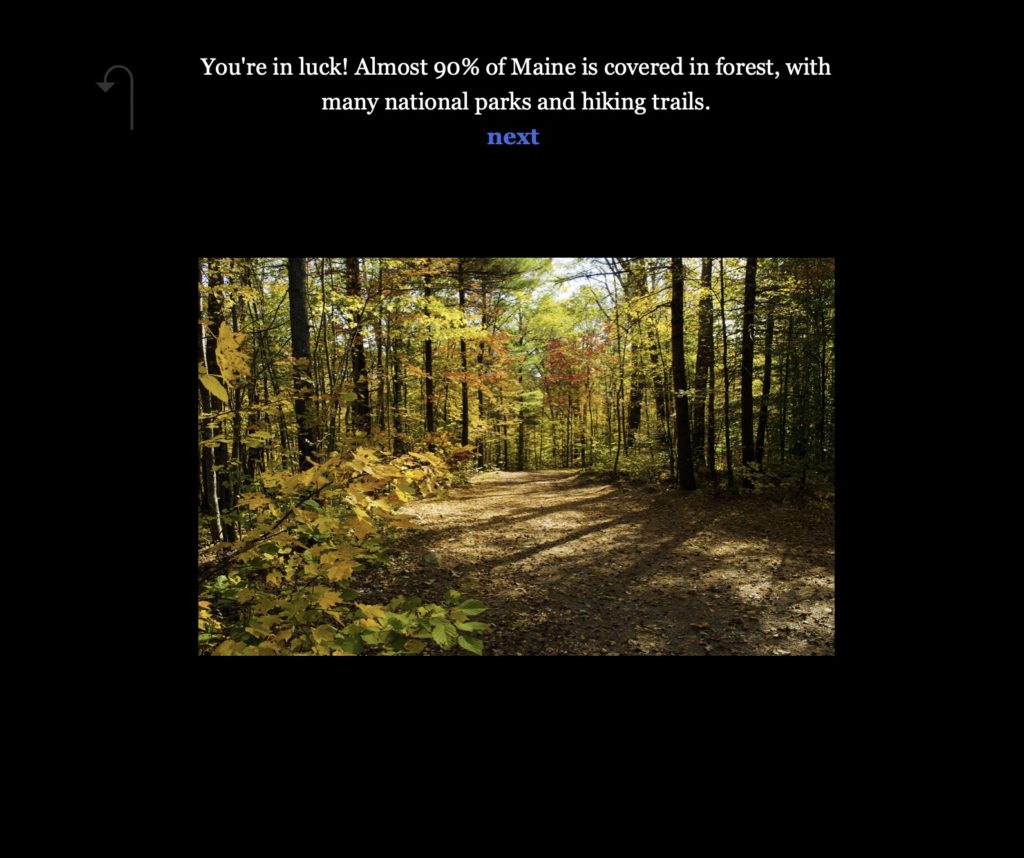
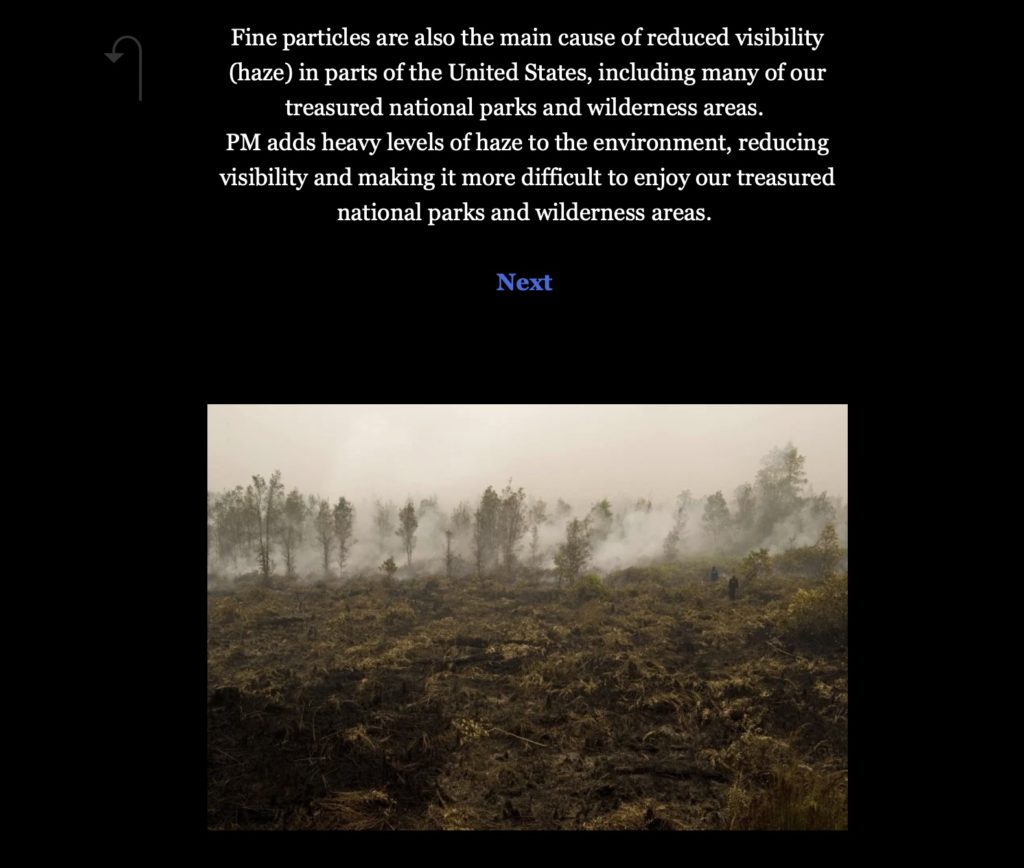
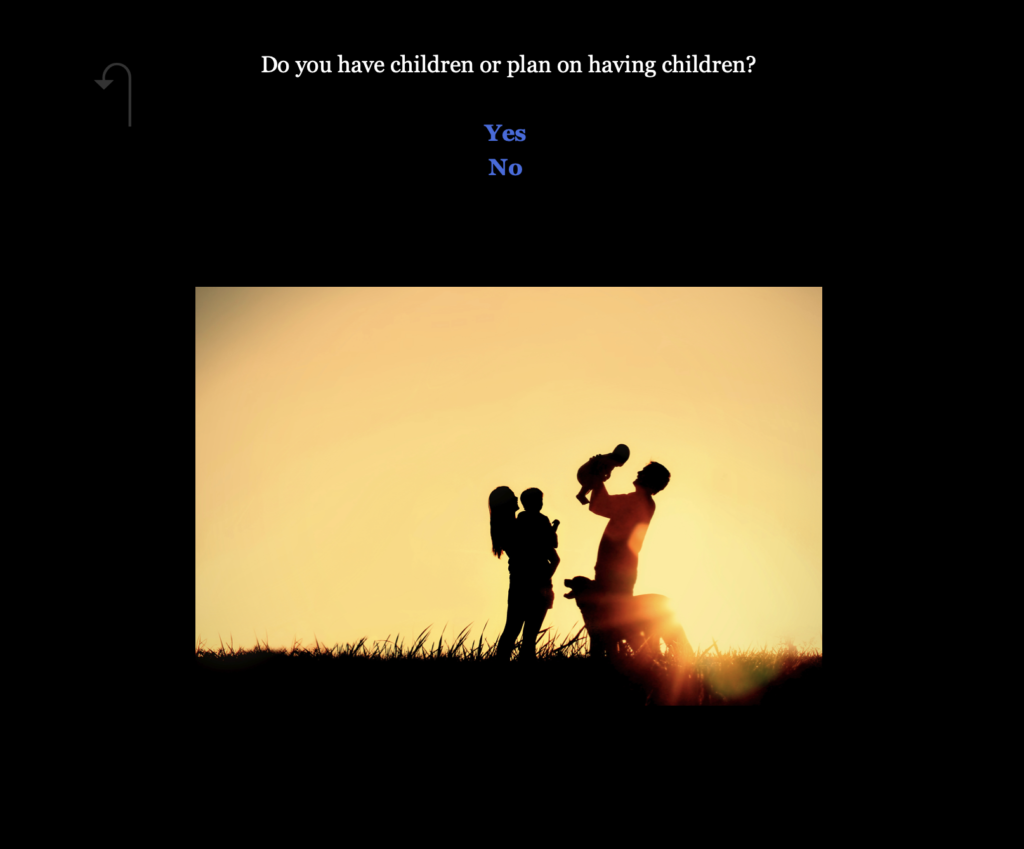
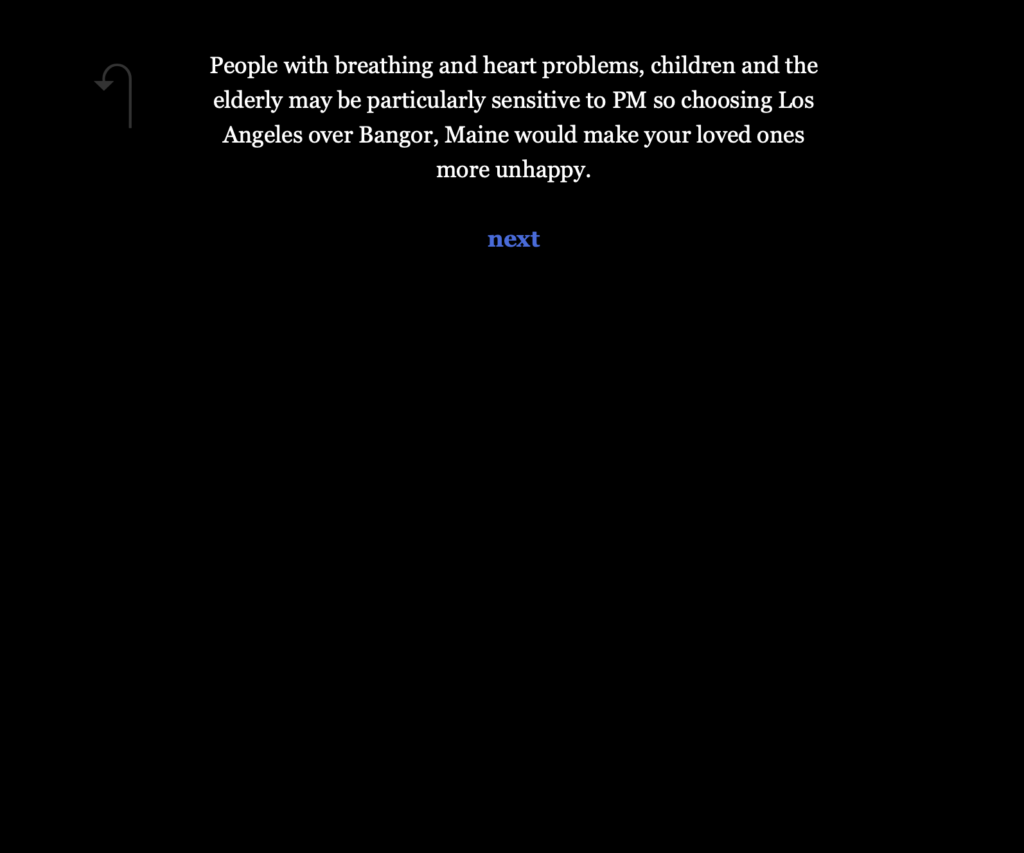


I think this is such an interesting and unexpected participatory game to create with the air quality data set. It’s also super smart to connect your game to the real world initiative the state has come up with to convince young people to move to Maine. I do think both the initial FB ad mock-up and the quiz itself could be more tailored to young people, either by changing the question or the images. Also, in the quiz slide about the levels of PM 2.5 in LA/Houston vs. Bangor, the image chosen to represent higher emissions looks like chimney’s in a factory. PM 2.5 does come from factories and power plants, but also from vehicle emissions. LA has way more cars than Bangor and vehicles play a large role in smog in LA, but the graph/image doesn’t give that impression. Second, you don’t mention what the average PM 2.5 in 2019 was for Bangor nor what a “good” or “bad” level of PM 2.5 is, so it’s hard for a quiz-taker to have some context around that number.
The advertising on Facebook is a really creative way to reach your audience. It’s a nice idea because I’d imagine that Maine would like more people to move there, so it works well with theme. It also is a nice incorporation of the air quality data.
One criticism I have is just that it would be nice to see more of the data. For instance, it asks about where I live (assuming I live in LA), but it doesn’t tell me how much PM there is in LA and maybe more context specific data on the air problems that LA has (similarly for Houston).
Overall I like the structure and outline of this project, but am not seeing as many intentional design choices around the data as I’d like to.
Centrality of participation:
Very central – the quiz is participatory, and makes up the whole project.
Rationale for design choices:
I can easily imagine the targeted ad showing up, so that makes sense. I’m curious to hear your thinking about the visual design of the quiz – it feels like you didn’t think that through. I understand this is a sketch, but suggesting how the quiz would look is an important piece of that.
Layers of reading:
I think this is a bit weak here. You’ve definitely included some pieces in the quiz flow, but each card could easily have a “learn more” link to explain something about that question in more detail, with more data and a source.
Appropriate data use:
You are clearly representing the data about comparing air quality of where the participant lives vs. Bangor. I like the work you did to find related information about Bangor and integrate it. I’d expect to see more data comparing things like the worst day in each city, or historical averages, or something like that. I’m not seeing as much data being used to tell the “clean air” story as I’d like to.
Suitability for audience:
Deciding to be an economic council or such of Bangor is a solid choice to set your context. An ad like this could be targeted to young folks that move a lot or something like that (though I wonder if those people still on Facebook?).
Narrative:
The quiz narrative is tight, and the Q&A format works here. The structure touches on multiple data points, and lays out a path through through in a well scaffolded way.
Call to Action:
This feels a bit misaligned here – moving to another city is a big deal, and that doesn’t seem acknowledged in the quiz. There’s a balance here of course between playfulness of the medium and impact of the decision. However, things like the “save your life” closer feel a bit incongruous with the feel of the piece. This would require some more iteration to get everything in alignment.
I think this is a fun and clever idea, taking on the character of an economic development agency is an interesting data user to work with. This may be a bit nit-picky, but I’m not sure that a quiz with only one outcome is really much of a quiz.. maybe you could weigh some of the questions and suggest different cities in maine that have different economic profiles? Like if someone is really interested in nature it suggests bar harbor but if they care more about city living it’s portland… taking on the position of Maine-wide economic development or something.
I liked how the quiz format allows the user to literally see themselves in the data and how the goals are very clear. The format allows you to inform the quiz-takers and share data as a way to back up your claims.
It would be nice to see more options in the quiz if you had more time to work on it — as it is right now, it’s conceivable that someone could take this quiz and answer no to three lifestyle questions and end up having less incentive to move to Bangor at the end of the quiz. It could also be interesting to have some kind of ranking of how good your situation is based on your current city vs other cities, to get more context. It would probably be too judgey to incorporate lifestyle choices into those rankings, but if there were other questions that the quiz asked that were directly connected to how the quiz-taker is affected by air pollution (maybe “how much time do you spend outside in the city”?), that could contribute to a final ranking (eg you’re in this percentile for air pollution effects out of the people who have taken this quiz).